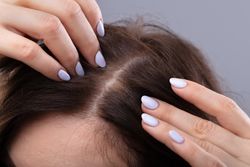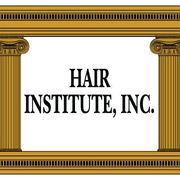
From balding patches to discoloration and thinning hair, you may notice that your locks look and feel different as you age. Thankfully, there are ways to address these changes if you aren’t comfortable with them. Here is some hair-loss information, so you know what to expect through the years.
How Does Aging Affect Hair?
20s & 30s
As hormone levels naturally decrease, hair strands slowly thin and won’t grow as long as they did during your teens and childhood.
After pregnancy, many women have post-partum hair loss and thinning hair. However, after giving birth, their hair typically regains pre-pregnancy thickness and strength.
Eating a healthy diet with protein, omega-3 fatty acids, and antioxidants encourages cell growth that can lengthen and strengthen both women’s and men’s hair.
40s
 Women often experience iron deficiency as their hormones change, and they reach pre-menopause. They may lose more hair than usual because they have less stored iron which reduces the ability to create hair cell proteins. If this sounds familiar, consider talking with your physician about taking iron supplements.
Women often experience iron deficiency as their hormones change, and they reach pre-menopause. They may lose more hair than usual because they have less stored iron which reduces the ability to create hair cell proteins. If this sounds familiar, consider talking with your physician about taking iron supplements.
Many men notice a balding pattern, including hair loss around the hairline and thinning near the crown of the head. Individuals with direct relatives who have hair loss often see the same pattern developing on their scalp, too.
Both men and women may notice gray hair during this period.
50s & 60s
As women go through menopause, they often notice thinning hair due to more androgen and less estrogen.
Many men begin balding or have thinning hair. People who want to improve their hair thickness and reduce hair loss may benefit from hair grafting or transplants.
70 & Older
Seniors may experience significant hair loss and brittle texture. Some seniors use Virtual Reality® or Folligraft® to address hair loss and restore their appearance.
Medical Hair Loss
Your genetics and age are significant hair loss factors, but the loss could also indicate health problems like anemia or thyroid disease. Additionally, changes in hair density and thickness may be side effects from medications or supplements.
To learn more about treating thinning or lost hair due to heredity and age, contact Hair Institute, Inc. in Lexington, KY. The area business has been in the industry for over 20 years, offering non-invasive techniques and top hair extensions, laser therapy, and transplants. Visit the website, or call the Alysheba Way location at (859) 263-9811 for information on their non-surgical hair treatments to bring back your confidence.
About the Business
Have a question? Ask the experts!
Send your question

